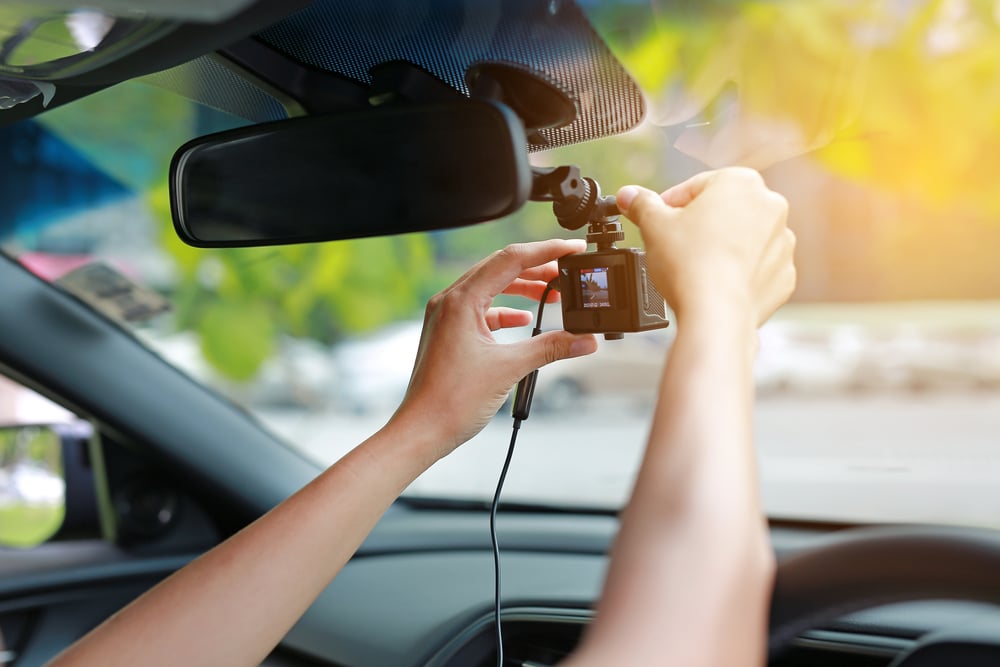
Last updated on October 31st, 2025 at 10:38 am
If you were injured in a car accident and are pursuing a personal injury case, you may wonder if you can use dash cam footage as evidence in court. It’s a common question. The short answer is that, with a few exceptions, you can. However, dash cam footage can sometimes be a double-edged sword. It might hurt or help your case. So, even if you can use the footage, you and your lawyer will also need to think about whether it will help you strategically.
When Can Dash Cam Footage Be Used in Court?
Dash cams are legal in Maine as long as they don’t obscure the driver’s clear view through the windshield of the road and traffic conditions. You can use the footage in court as long as it meets these conditions:
- The dash cam footage must be authenticated in court to be admitted as evidence; this means that your lawyer must demonstrate that the footage is what it purports to be.. Your lawyer must use fact witnesses or other methods to establish that the footage is accurate, dependable, and hasn’t been altered. You may need to make a statement under oath.
- The footage should be useful to the jury or factfinder. Often, dash camera footage is low quality. If it’s grainy or so dark that you can’t tell what is going on, it won’t be useful and may not be allowed as evidence.
- If the dash cam creates audio recordings of conversations, it may violate someone’s privacy. In Maine, audio recordings are legal even if only one person in the conversation consents to being recorded. Any conversation that you are a part of would be allowed. However, if a dash cam recorded a conversation you weren’t a part of, this could raise legal questions that could complicate the choice whether or not you want to use it. You should discuss these with your lawyer . In that case, that raises an issue that your lawyer must address you, and the footage may not be admissible in court.
Examples of How Dash Cam Footage Can Help or Hurt Your Personal Injury Case
If you’re pursuing a personal injury case in Maine, one of your key tasks is to prove that the other driver was primarily at fault for the accident. Dash cam footage can be instrumental in providing strong evidence of what transpired just before the crash. For instance, if the footage clearly shows the other driver running a red light, this will significantly bolster your case by establishing the other driver’s responsibility for causing the accident.
Other examples of helpful dash cam footage show the other driver speeding, breaking traffic rules, making unsafe turns, or driving erratically. In addition to showing the other driver’s behavior, dash cam footage can also show weather and road conditions at the time of the accident. And, if the other driver is lying about what happened, the dash cam footage may show that the driver lacks credibility and shouldn’t be taken at their word.
However, dash cam footage can hurt your case if it shows that you were also at fault. For example, if you were speeding right before the accident, and your dash cam recorded your speed, that could be used against you.
Using Dash Cam Footage If You Don’t Go to Trial
Most personal injury cases don’t go to trial. Instead, they are settled in negotiations between your lawyer and the other driver’s insurance company. If you have dash cam footage that helps show the other driver’s negligence, your lawyer may be able to use it to negotiate a larger settlement.
When you have important questions like whether you should use dash cam footage in your case, you need to have a lawyer who you can rely on. The personal injury attorneys at Garmey Law have the experience, knowledge, and sound judgment to help you get the total compensation you deserve. Contact us today for a free consultation.